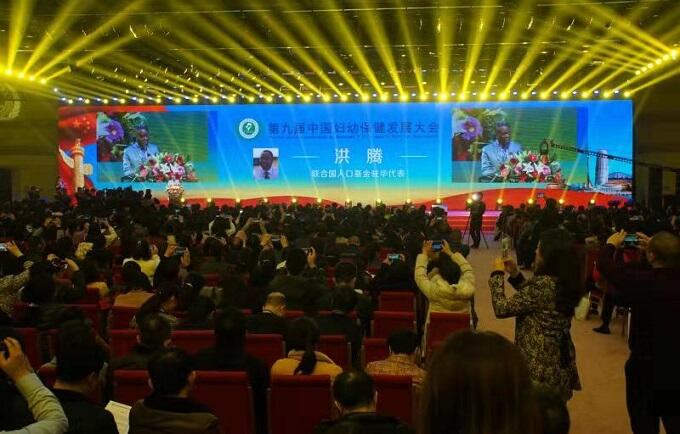28 November 2018, Zhengzhou City, Henan Province
Distinguished Mr. Dai Baihua, Vice Governor of Henan Provincial Government,
Distinguished Mr. Chen Ziquan, President of CMCHA,
Distinguished Mr. Qin Geng, Director General of National Health Commission,
Dear friends, colleagues, ladies and gentleman,
On behalf of the United Nations Population Fund (UNFPA), it is my pleasure to deliver remarks on the occasion of the 9th Annual Conference on China Maternal and Child Health Development. I would like to thank the China Maternal and Child Health Association (CMCHA) and Henan Provincial Government for organizing this important event in the beautiful city of Zhengzhou.
China has achieved significant progress in improving the health of women and children, particularly in reducing maternal deaths and morbidities. In fact, China is one the few countries that achieved the MDG 5 target on reduction of maternal deaths by 2015 through targeted policies and concrete actions coupled with robust monitoring and accountability systems, functional multi-sectoral coordination mechanisms, increased national and local financial resources, and effective partnerships. Chinese government regards women’s health as a high priority as reflected in the “Healthy China 2030” plan, the China Women’s Development Programme (2011-2020), as well as in national laws. UNFPA has cooperated with Chinese government and relevant organizations since 1979, and we bear witness to the progress and achievements in health and social development fields over the past 40 years.
However, there are still gaps and challenges in China and other developing counties to achieve universal access to sexual and reproductive health as encapsulated in Agenda 2030 for Sustainable Development. For example, some 830 women still die worldwide every day from causes related to pregnancy and childbirth. Majority of the women die from severe bleeding, sepsis, eclampsia, obstructed labor and the consequences of unsafe abortion. Most of these causes can be effectively addressed by providing skilled and respectful care in a safe environment during delivery, timely access to quality emergency obstetric care, and access to contraception to prevent unintended pregnancies.
Safe motherhood is a human right, and it is at the core of UNFPA’s mandate. In 2018, UNFPA launched efforts to achieve three transformative results – ending unmet need for family planning, ending preventable maternal deaths and ending gender-based violence and harmful practices.
Abundant evidence shows that well-trained midwives could deliver 87 per cent of all essential sexual, reproductive, maternal and newborn health services and avert roughly two thirds of all maternal and newborn deaths. UNFPA, together with over 40 global partners and over 300 national partners, works to scale up quality midwifery education, policies and services around the world. We also work to strengthen midwifery training curriculum, institutions, associations and regulations. Since 2011, UNFPA has been working with the CMCHA and other partners to promote natural delivery and midwifery profession development in China. In the current cycle of cooperation between the Government of China and UNFPA (2016-2020), UNFPA is continuously supporting efforts in developing an enabling policy environment, quality education and training for new and current midwives, and promoting high standards for midwifery service delivery.
China’s experience in improving maternal and child health should be shared with other developing countries. China also has significant capacity in production of quality medical equipment and pharmaceutical products which are much needed for improving maternal and women’s health care in resource limited countries. Chinese President Xi announced 8 initiatives in support of African development in the coming three years underpinned by a $60 billion assistance program during the FOCAC meeting held in September. “Women and Children’s Health Initiative” in the health component is one of the most important actions listed. In addition, there is the $3 billion SSC Assistance Fund established in 2017. Governmental agencies, academic institutions, civil society organizations, like CMCHA, and the business sector working together, can thus take full advantage of China’s growing role in global health and development to advance the sexual and reproductive health of poor women and young people in countries along the Belt and Road Initiative and Africa.
As a broker of international technical expertise on reproductive health, including maternal health, and a facilitator of international cooperation and knowledge exchange, UNFPA is committed to facilitating this process and supporting China’s aspirations to promote SSC and knowledge sharing to advance sustainable development, including reproductive and maternal health.
Participants at this Conference represent the diverse community of professionals, policy makers, programme managers and service providers in the field of sexual, reproductive, maternal, child and adolescent health. Your innovation and incessant efforts will surely contribute to the attainment of the SDGs in China. UNFPA, together with other UN agencies and international organizations, have enjoyed a fruitful cooperation with all of you along this journey of promoting women’s, adolescents’ and children’s health and look forward to continued close partnership. Next year - 2019 - is the 25th anniversary of the International Conference on Population and Development (ICPD) and a critical year for implementing the 13th National Development Plan and 2030 Healthy China Initiative. Let us therefore join hands to work together to accomplish universal health coverage including access to quality maternal and reproductive health care.
I wish you a successful conference.
Thank you very much. Xiexie!



